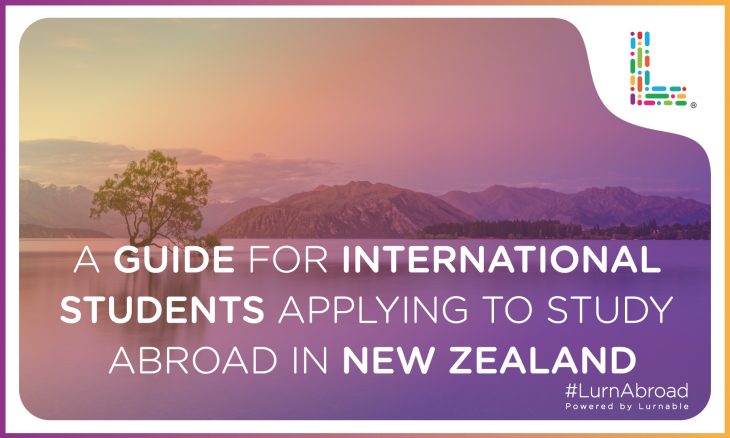You may find yourself thinking, ‘New Zealand sounds like a great option! But how do I study abroad in New Zealand?’. We’ve got this covered for you. Our guide will provide you with everything that you need to know for the most successful university application as an international student.
APPLICATION PROCEDURE
To apply for your university course in New Zealand, you will generally need the following:
- Application form (from your university website).
- A copy of your passport.
- Academic certificates and transcripts of your qualifications and Diploma/s from high school and your upper secondary education.
- Language exam certificates and results (such as IELTs).
- CV.
- Statement of Purpose.
- Letter of Recommendation.
- Aptitude test certificates, such as GMAT certificates (if required by your university).
You may also be required to take part in an interview.
- You will need to submit your application directly to your university. You may be required to do this via the university website, email or their specified online platform.
- Once your application has been processed, some universities may invite you to an interview. Interviews are not common for undergraduate applications. Nevertheless, it is important to check your university course requirements to ensure that you can prepare for them.
- Next you will need to apply for a visa to study in New Zealand.
- Following this, the chances are you have been successful in your application! Time to celebrate!
- Don’t forget to book your transport and accommodation!
- You may be in the unfortunate situation where your application has been rejected. It is frustrating and we can find ourselves thinking, ‘what did I do wrong?’ We have all been there. Importantly, you still have options to get into university.
- A popular route onto university courses is by taking a foundation course at your university.
- If you where qualified but not accepted onto the course, you could take a gap year working in the industry to gain the experience needed to boost your application.
This is the standard academic route for getting into University, however, you may also be able to access the course by other means. Contact your university for their advice.
APPLICATION DEADLINE
The deadline for your application will vary depending on the semester/trimester by which your course starts.
For most universities, if you begin your course in the 1st Trimester or Semester (enrolling in March), you will be required to apply around the 1st December.
APPLICATION TIMELINE
Universities in New Zealand follow two-semester and three-trimester systems meaning that you can apply during different periods of the year. This timeline will cover the earliest enrolment dates in the year. Following this guidance, you can expect to enrol on the first semester/trimester of university in March.
- Language Tests (and aptitude tests if requested by university): 1st June. Now is the time to register and prepare for these tests.
- Secondary School Results Day: 6th July. Your IB Diploma (or equivalent) results will be released during this time period. Ensure that you keep your qualification transcripts and certificates so that you can submit them with your application.
- Begin Application: 1st September. You will need at least 3 months to shortlist your chosen university, collect your letters of recommendation (if required), and begin writing your personal statement.
- Interviews: 1st September – Mid-November. If required, most universities will arrange interviews to be conducted around this time.
- Application Deadline: 1st December. This is the earliest New Zealand university application deadline by which you may be required to submit your application.
- University Place Announced: Mid-December – 28th February. University offers will be announced during this time-scale.
- University Enrolment Begins: 1st March.
- It is likely that you have been admitted to university! This takes a lot of hard work to organise so well done you! Now you need to arrange your university accommodation and transport.
- If you did not qualify for university admission due to Language requirements, now is the time to apply for English Pathway or foundation courses.
- If you where unfortunate enough to not meet grade requirements, now is the time to arrange a foundation course or make alternative arrangements to become qualified.
- If you was qualified, but still unluckily not offered a university place, now is the time to make preparations to boost your next application (For instance, take a gap year to work in the industry, do competitions, etcetera) or consider other course options.
This timeline does not include 2 other essential preparations you must make; visa applications and arranging funding (e.g. by applying to scholarships etcetera). You must ensure that you begin this as soon as possible.
This is the standard application route, but there may be other modes for obtaining your Degree in New Zealand.
FEES FOR INTERNATIONAL STUDENTS
New Zealand offers cheap university courses for international students from as low as $20,000 NZD to $45,000 NZD. Fees vary amongst New Zealand Universities so ensure that you are aware of your chosen course’s fees.
SCHOLARSHIPS AVAILABLE FOR INTERNATIONAL STUDENTS
Now that you are confident and ready to prepare for your course you are likely feeling excited to start this new adventure. But you keep questioning, how am I going to fund this course? We’ve all been there, luckily there are several scholarship and funding options for international students.
To apply for international scholarships and funding, check that you are eligible. Your eligibility will depend on your grades, potential, income, country of residence, situation and gender. There are so many universities and organisations offering scholarships for a diversity of individuals so it is likely that there are several out there just waiting for you.
To find your scholarships and more useful information, check your university and the New Zealand Ministry of educations’ websites New Zealand scholarships – find a Scholarship | Study with New Zealand.
Scholarships are highly competitive so make sure that you apply for your student funding as early as possible.
We hope that this article helped you feel reassured in your decisions and plans to study in New Zealand. If you feel that New Zealand was not right for you, look out for our brilliant guidance and advice on your study abroad options in other countries!

If you are considering studying abroad why don’t you discuss your prospects and opportunities with experts at Lurnable’s dedicated study abroad counselling division LurnPathways?






